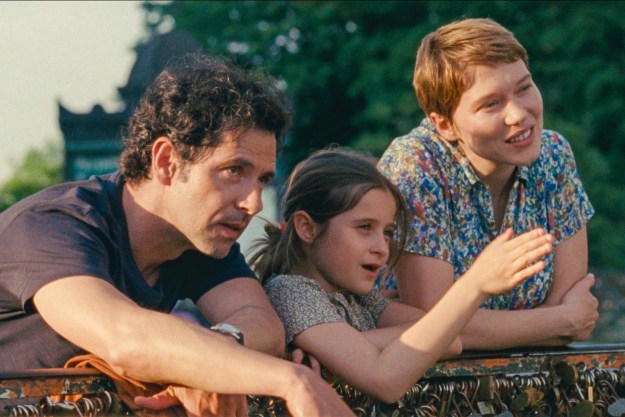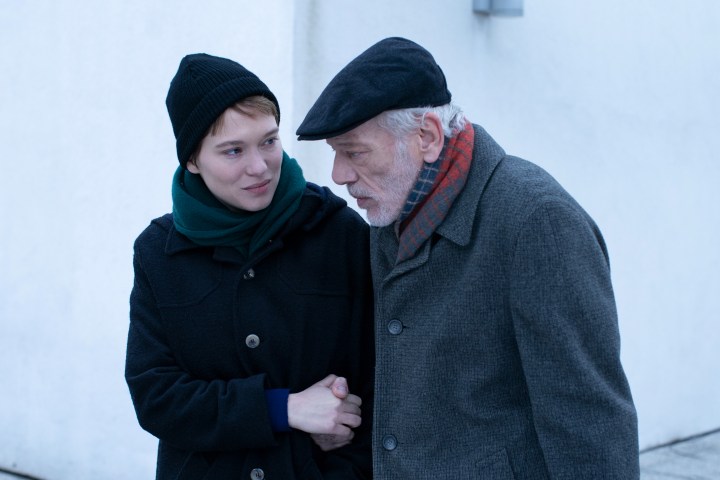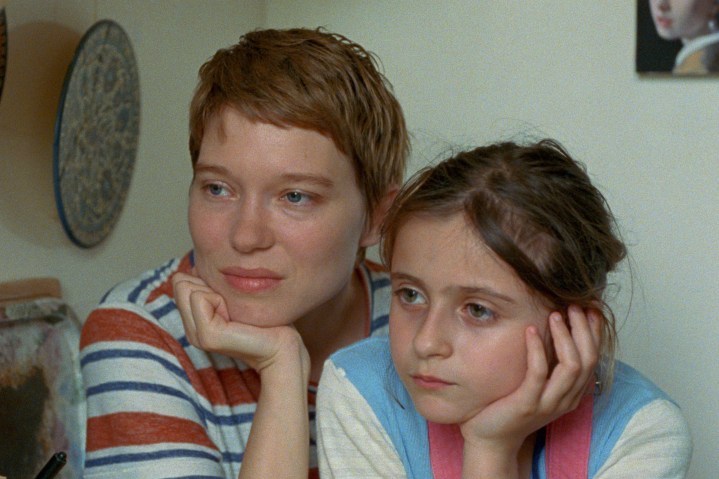
“Anchored by a spellbinding performance from Léa Seydoux, One Fine Morning is another gentle, heartbreaking character study from writer-director Mia Hansen-Løve.”
- Léa Seydoux's lead performance
- Mia Hansen-Løve's layered, unsentimental screenplay
- Denis Lenoir's warm, sunny cinematography
- A repetitive second act
- An underdeveloped romance
- Melvil Poupaud's one-note performance
There’s a quiet magic present in all of Mia Hansen-Løve’s films. Over the past 15 years, the French writer-director has slowly established herself as one of cinema’s most unique and assured contemporary voices. Her 2021 film, Bergman Island, not only felt in many ways like Hansen-Løve’s biggest and most accessible film to date but also her most structurally effective and artistically assured. Now, two years later, Hansen-Løve has returned with One Fine Morning.
The new film has more in common with some of Hansen-Løve’s past French-language films — namely, 2014’s Things to Come — than it does with Bergman Island. Many of the biggest hallmarks of its filmmaker’s past work are present in One Fine Morning, which follows a woman who, in typical Hansen-Løve fashion, never slows down or pauses long enough to let herself think as deeply as she deserves. Coming off her recent collaborations with Isabelle Huppert and Vicky Krieps, One Fine Morning also sees Hansen-Løve direct Léa Seydoux, another one of international cinema’s brightest faces, for the first time.
While the film isn’t quite as thematically or stylistically impactful as Bergman Island, Seydoux’s fearless lead performance grounds it in an emotional space that proves to be far more expansive than it may initially appear.

Seydoux stars in One Fine Morning as Sandra Kienzler, a professional translator and single mother who spends most of her days worrying about and caring for her elderly father, Georg (Pascal Greggory), who has been crippled by a neuro-degenerative disease that has robbed him of his sight and cognitive abilities. When she’s introduced in One Fine Morning, Sandra has already grown used to dividing all of her attention between Georg and her daughter, Linn (Camille Leban Martins). Her ability to juggle so many responsibilities at once makes Sandra a natural subject for Hansen-Løve, a filmmaker who has long been fascinated by women who are capable of carrying their struggles with them without ever falling apart.
There is, of course, more to Sandra’s life than she lets on. Seydoux’s performance, in conjunction with Hansen-Løve’s script, delicately alludes to — and occasionally outright addresses — the emotional turmoil that is lurking beneath Sandra’s every waking moment. In One Fine Morning, Seydoux’s Sandra is presented as a woman in need of not only some stability but also a distraction. She finds a lot of the latter, though not necessarily much of the former, in an affair she impulsively begins with an old married friend, Clément (Melvil Poupaud).
The more Sandra struggles with the weight of her father’s disease, the more desperately she tries to hold onto Clément. Doing so is a fool’s endeavor, and Clément’s conflicting desires to stay with his wife and be with Sandra cause both of them more than their fair share of strife. While Hansen-Løve depicts Sandra and Clément’s affair with her usual, clear-eyed honesty as well, there are moments throughout the film’s second act when the on-again, off-again nature of One Fine Morning’s central romance does begin to feel repetitive.

As can occasionally be the case with Hansen-Løve’s male characters, Clément never feels as fleshed-out or compelling as Seydoux’s Sandra or even Sandra’s mother, Françoise, who is played with real confidence and wit by Nicole Garcia. Melvil Poupaud’s performance never matches Seydoux’s intensity or emotional vulnerability, either, which leaves Sandra and Clément’s romance feeling strangely one-note at certain points. Fortunately, while Sandra spends much of her time thinking about Clément, their affair isn’t the main focus of One Fine Morning.
Over the course of its 112-minute runtime, the film uses all of the specific details of Sandra’s life to paint a compelling, gently heartbreaking portrait of one woman’s largely mundane existence. By the time everything is said and done, Sandra feels just as well-drawn and compelling as any of Hansen-Løve’s past heroines, and that’s thanks to both the film’s unsentimental screenplay and Seydoux’s raw, magnetic central performance.
The tragedy of Sandra’s father’s illness serves as a constant reminder throughout One Fine Morning of just how easily everything can slip away from us. Her desire to hold onto everything around her with as much passion and hope as she can is both tragically misguided and all too understandable, which is where the real magic of Hansen-Løve’s films ultimately lies. The French filmmaker creates movies about people who, even in the midst of monumental chaos, always manage to find new ground to stand on — no matter how unsteady it may be.
In One Fine Morning, it’s impossible not to see the cracks in the makeshift foundation that Seydoux’s Sandra builds for herself, but that only makes her desire to stand on it all the more admirable — if also a little painful.
One Fine Morning is now playing in select theaters.



